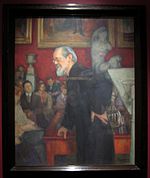Vasily Klyuchevsky, Date of Birth, Place of Birth, Date of Death
TweetVasily Klyuchevsky
Russian historian
 Date of Birth: 16-Jan-1841
Date of Birth: 16-Jan-1841
 Place of Birth: Voskresenovka, Russia
Place of Birth: Voskresenovka, Russia
Date of Death: 12-May-1911
Profession: historian
Zodiac Sign: Capricorn 
About Vasily Klyuchevsky
- Vasily Osipovich Klyuchevsky (Russian: ??????? ???????? ??????????; 28 January [O.S.
- 16 January] 1841 in Voskresnskoye Village, Penza Guberniia, Russia – 25 May [O.S.
- 12 May] 1911, Moscow) was a leading Russian historian of the late imperial period.
- Also, he addressed the Russian economy in his writings. A village priest's son, Klyuchevsky studied at Moscow University under Sergey Solovyov, to whose chair he succeeded in 1879.
- His first important publications were an article on economic activities of the Solovetsky Monastery (1867) and a thesis on medieval Russian hagiography (1871). Kluchevsky was one of the first Russian historians to shift attention away from political and social issues to geographical and economical forces.
- He was particularly interested in the process of Russian peaceful colonisation of Siberia and the Far East.
- In 1882, he published his landmark study of the Boyar Duma, whereby he asserted his view of a state as a result of collaboration of diverse classes of society. In 1889, Klyuchevsky was elected to the Russian Academy of Sciences.
- Although his lectures were highly popular with the students of Moscow University, only a few of his works were intended for publication, e.g., a handful of biographies of "representative men", including Andrei Kurbsky, Afanasy Ordin-Nashchokin, Feodor Rtishchev, Vasily Galitzine, and Nikolay Novikov. The last decade of his life was spent preparing the printed version of his lectures.
- He also became interested in politics, and joined the Constitutional Democratic Party.
- Maxim Gorky records the following dictum by Leo Tolstoy: Karamzin wrote for the tsar, Solovyov wrote lengthily and tediously, and Klyuchevsky wrote for his own pleasure.
Read more at Wikipedia

